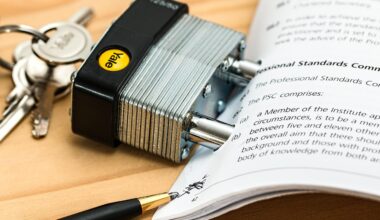Steps to Take When You Receive an IRS Audit Letter
Receiving an IRS audit letter can be incredibly stressful. The first step you should take is to read the letter carefully. Ensure you understand the specific items the IRS wishes to review, the tax years in question, and the instructions provided. Keeping a calm demeanor is vital during this process. You should gather all relevant documents and records related to the items mentioned in the audit letter. This includes income statements, receipts, bank statements, and any tax forms related to the inquiry. The IRS often requests documentation to substantiate claims or deductions taken on your tax return. Ignoring the letter will not make the audit go away; respond promptly to avoid further complications. It’s essential to note deadlines mentioned in the letter and ensure you meet them. Consulting with a tax professional can be invaluable at this stage, as they can provide advice tailored to your situation and help you respond effectively. Understanding your rights when facing an audit is crucial, as is being honest and cooperative throughout the process.
Next, you should consider writing a response to the IRS audit letter. In your response, indicate that you have received the letter and are preparing the necessary documentation. Clarifying any points of confusion from the letter can help clear up misunderstandings early on. If you believe there has been an error regarding the amount the IRS claims you owe, make sure to detail this in your response. Include your supporting documentation that substantiates your position or any corrections that need to be made. This helps establish clarity and demonstrates your commitment to resolving the issues at hand. Timeliness is crucial; send your response well before the deadline stipulated in the letter to show your willingness to cooperate. When possible, use certified mail or another delivery method that provides proof of sending and receipt. This documentation can be beneficial should there be any disputes about response timings in the future. Remember to keep copies of all correspondence for your records. The IRS process can be lengthy, so patience will be important as you navigate through these audits.
Engaging a Tax Professional
It’s often advisable to engage a qualified tax professional, especially if the audit appears complex or involves significant financial amounts. A tax attorney or CPA can offer insight and representation that can make the process smoother. They are familiar with IRS processes and can help prepare your case more effectively than you might on your own. This is particularly essential if you feel overwhelmed or unsure of your obligations and rights during the audit. A professional can help indicate what information the IRS is likely focused on, enabling you to tailor your documentation presentation more effectively. They can also advise on the potential outcomes of your audit and how best to proceed in each scenario. Their expertise may also help you communicate more efficiently with IRS representatives, ensuring you understand their inquiries and provide the needed responses accurately. Furthermore, tax professionals can accompany you during any meetings with the IRS, ensuring that you do not inadvertently say something that could jeopardize your standing. Having professional representation alleviates much of the stress involved in dealing with an audit.
Document everything throughout the audit process. Keep meticulous records of all communications with the IRS, including notes from phone calls and copies of any letters sent or received. This documentation serves several essential purposes. First, it provides a timeline of the audit process, which can be crucial if questions arise later about compliance with IRS requests. Second, it can help clarify misunderstandings and may be pivotal should there be any disputes regarding the information provided. The IRS audit may require you to attend meetings, and having documentation on hand can help you stay organized and focused. You should also track your time spent on the audit, as this information can be valuable should you seek to claim any deductions related to this matter in future tax filings. Be sure that all documentation you provide is legitimate and accurate. Providing false information can lead to penalties, including possible criminal charges. Ultimately, being organized and proactive about your documentation can ease the audit burdens, helping you navigate this challenging situation more effectively.
Taking Care of Your Mental Health
Dealing with an IRS audit can take a toll on your mental health. It’s important to acknowledge the stress it can create and take care of yourself during this time. Engaging in stress-reducing activities such as exercise and meditation can be beneficial. Talking to friends or family about the situation can also provide emotional relief and perspective. If necessary, consider consulting a mental health professional to help manage anxiety or stress related to the audit process. It is not uncommon for individuals to feel overwhelmed by the IRS, but remember, you are not alone in this experience. Many have successfully navigated audits and come out on the other side with lessons learned. Focusing on your well-being will not only help you deal with the audit better but can also improve your overall productivity while dealing with this challenge. Establishing a support network and discussing your concerns can alleviate much of the burden you may feel. Taking breaks between tasks and engaging in enjoyable activities can also help keep stress levels manageable.
After the audit has been concluded, it’s essential to understand the outcome and its implications fully. You should receive a report from the IRS detailing the findings and any resulting actions you need to take. If the audit reveals discrepancies that require additional taxes owed, make sure to address them promptly to avoid further penalties. If you disagree with the conclusions of the audit, you typically have the right to appeal the findings. You can discuss this option with your tax professional to evaluate the best course of action based on the IRS’s feedback and your provided documentation. If any audit adjustments are approved, inquire about how they may affect your future filing. Being proactive and attentive to these results can help ensure you remain compliant with tax obligations moving forward, thus minimizing potential future audits. Any refunds due should be mailed promptly as well, so keep track of these to ensure timely receipt. Addressing any audit-related issues effectively can help you avoid compounding problems in the future.
Preventing Future Audits
After navigating through your audit, take steps to implement practices that may help avoid future audits. Maintaining accurate and thorough documentation year-round is a vital preventive measure. Organizing your financial records can streamline both your tax filing and provides security in the event of another audit. Ensure all forms are completed correctly and submitted on time. Additionally, working with a tax professional can help you spot potential red flags in your tax filings that might trigger further scrutiny from the IRS. Consider investing in bookkeeping software or a professional bookkeeping service to keep your financial records in order. Deductions should be well substantiated and clearly recorded to make your taxation clearer. Also, take the time to review any changes to tax laws and regulations that might affect your obligations. Staying informed about compliance guidelines can protect you against mistakes that may lead to audits. Remember, accurate reporting and proactive communication with the IRS when necessary may assist in averting future issues and keep your tax situation manageable.
The steps taken after receiving an IRS audit letter can significantly impact your overall experience. Thus, being well-informed and prepared is essential. This preparation may reduce anxiety and increase confidence in resolving the audit efficiently. The assistance from tax professionals, if necessary, cannot be understated. Their expertise will navigate you through the complexities with ease. Remember to keep your mental health in check as the process can be emotionally taxing. Taking constructive steps can lead to better outcomes and pave the way for a smooth experience. Scrutinizing the audit results and proactively avoiding errors may save both money and stress down the line. The goal is to learn from the experience and strengthen future tax practices, ensuring you maintain compliance. Once the audit concludes, focus on the actionable insights gained from the process. With diligence and informed decisions, you can manage your tax obligations more effectively, but awareness prevents future pitfalls. Ultimately, receiving an IRS audit letter does not have to be a daunting experience if approached meticulously.


